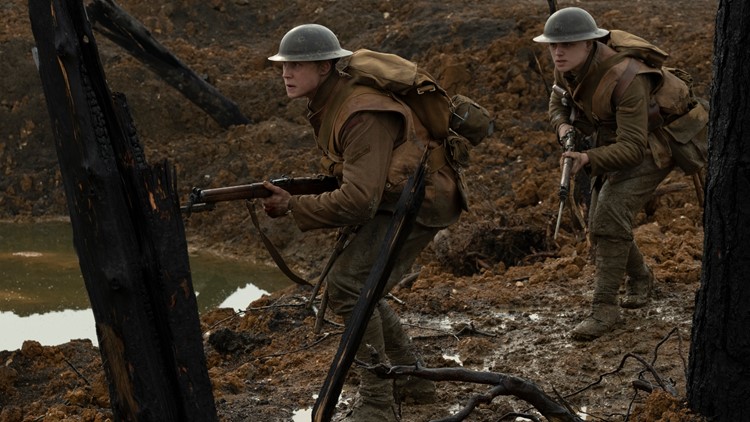What if you had a matter of hours to take a message across enemy territory all the way to a large platoon of your fellow soldiers who were about to walk into a trap — and your own brother was among the members walking into impending doom?
That's the dilemma for a pair of British soldiers, Blake (Dean-Charles Chapman) and Schofeld (George MacKay) in Sam Mendes' latest feature, "1917," a movie that that thankfully focuses on World War I for a change.
The First Great War hasn't gotten a great deal of cinematic publicity. For the majority of my life, films have revolved around either World War II or Vietnam. For some reason, the juice isn't worth the squeeze in the deadlier war that took place more than a hundred years ago, or perhaps the story just wasn't right.
It's personal for Mendes, whose own grandfather was a runner in World War I. The esteemed director of "American Beauty" and "Road to Perdition" turns the memories into filmmaking firepower here, changing the game in a big way. He shines a light on a war that many should know more about. A series of battles that claimed up to 100 million lives when casualties from combat and the ensuing influenza were taken into account.
Mendes doesn't just make your run-of-the-mil,l real-time thriller here; he reportedly got most, if not all, of the film shot in a continuous take that follows these two soldiers across the war-torn battlefields stuffed with traps, explosives, dead bodies, mounds of dirt and mud and way too much stress. Whenever Blake peeks into a door, we are right on his shoulder. When a rat causes a bomb to go off, it's felt inside the corners of the room in which you're watching the film.
You could call the impact of Mendes' film visceral and relentless because this journey of a day or so feels like a month when all the credits start to roll.
MacKay, last seen prominently in the terrific "Captain Fantastic," gives a breakthrough performance as the guy with whom Blake picked to go on a seemingly one-way mission. He doesn't overplay many scenes, instead clenching his emotions right up around his cheekbones. "Game of Thrones" fans will notice Chapman, who played Tommen on the hit HBO series. The two actors form a convincing duo in this race-against-time plot.
The supporting cast is chock full of very noticeable Brit actors in Colin Firth, Mark Strong and Benedict Cumberbatch. They pop up for a few minutes, warn the boys about something fierce and disappear. It's not hollow work, but mere cameos with extra icing on top that aid the film's pace. The onus of the film's weight falls on the two relatively new actors, especially MacKay.
It's just one thread of Mendes' unconventional approach to making a war film. He follows in Christopher Nolan's "Dunkirk" footsteps, resisting the urge to pour on the dramatics, instead understating even the most white knuckle action sequences that come out of nowhere. When a plane starts to descend towards a cabin the soldiers are searching, it's a slow, deafening descent that will make your hands go up in the air. Yes, you'll scream "MOVE!"
Roger Deakins' cinematography is breathtaking, staging each shot like a bullet traveling through the air in slow motion but with the utmost intensity. It's his camera placement combined with Thomas Newman's superbly low-key score that elevate the practitioner methods here. Those are the two things, along with MacKay's work, that you'll be talking about.
"1917" represents a towering achievement for Mendes, who clearly made this as a love letter to his grandfather, but also wanted another chance to explore the instantaneous toll of war on your friend in the company and your family at home. The one-take idea isn't played off as a gimmick here, with the filmmaker putting together a thrilling climax that sees Mackay stumbling across a battlefield littered with bombs, bullets, and mayhem. All to deliver a letter. It's stunning work.
The movie saves most of its power for the final handful of scenes, where Newman's score pours it on and the characters come to a head in their journey. For much of the film, you are on the film, dazzled yet hurried, so the calmer end was fitting.
I didn't adore everything about this film. Like Nolan's war film, this one kept the audience at a distance at times emotionally, resisting the urge to grow melodramatic or add extra action. Once again, by the end, you are sewn into the fabric, but it doesn't happen in the first two acts. I wasn't blown away by the film's emotion like I expected, more like very impressed with what Mendes achieved.
I think he set out to do a few things: Honor his family, make a different kind of war film, and shine a light on a war that doesn't get enough film treatment. He succeeded.
"1917" is a film that needs to breathe a bit after it's over. You'll be ruminating on it as you drive home to a safe house that won't blow up or hide sadistic German soldiers inside of it. The heart rate will slow down, you'll start to put it all together, and it'll hit you.
I'm going to watch it again for sure. Savor the flavor of Mendes' mission. A special one that is equally devastating and original.



